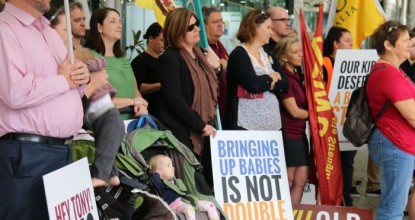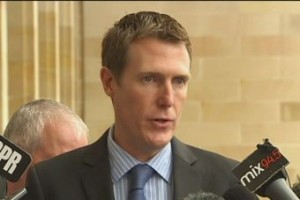Another Chapter to the Paid Parental Leave Saga

In another chapter to the saga which is the Coalition’s position on parental leave, yesterday, Social Services Minister Christian Porter announced that he wanted amendments to the Federal Government’s Paid Parental Leave scheme to pass through the Senate and come into effect by 1 January 2017, just ten weeks away.
The amendments would see parents who receive payments from their employers for having a child be prevented from accessing the Federal Government’s Paid Parental Leave Scheme, which provides for up to 18 weeks of payments at the national minimum wage of $672.70 per week, or a total of $12,108.60.
Whilst there is no obligation to do so, some employers currently provide their employees with payments for parental leave on top of the government’s scheme. Businesses do this for a variety of reasons, including wanting to assist employees and their families through a difficult and undeniably expensive period of time, wanting to encourage parents to spend time with their new baby rather than rush back to work due to financial concerns, attempt to reduce the gender pay gap and in a bid to encourage employees to remain loyal to the business.
Under changes to the paid parental leave scheme which the Turnbull Government is hoping to bring in by the passing of the Fairer Paid Parental Leave Bill 2016, employees who receive payments from their employer for parental leave will only be able top up their payment to $12,108 or if they receive more than that from their employer, they will not be able to access the government scheme at all.
As an example, if an employee is provided with payments totalling $10,000 from their employer for parental leave, they will only be able to top up their paid parental leave by a further $2,108 from the government. If an employee receives $15,000 from their employer, they will be excluded from receiving any payments from the government.
This is the third change in the Coalition’s policy in three years. In the lead up to the 2013 federal election, Tony Abbott promised to pay women 26 weeks wages up to a threshold of $150,000 per year plus superannuation on each occasion they had a child. Had this policy been bought in, women would have been eligible to receive up to $75,000 from the government. This policy was later revised due to a budget “emergency”.
In May 2014, Abbott announced a change to the previously promised policy, with plans to provide women with 26 weeks of paid parental leave up to a threshold of $100,000 per year plus superannuation. This had the effect of reducing the total amount eligible to be received to $50,000. This policy was later dumped due to lack of parliamentary and party support.
Then, in one of the largest election backflips in Australian political history, Abbott announced in May 2015that the Coalition had again had a change in policy and that it planned to prevent women from “double dipping”, which they took to mean that parents would not be allowed to access the government scheme if they received parental leave payments from their employers. This complete backflip in policy meant that in a period of less than two years, the Coalition had varied their policy on three occasions, resulting in parents being up to and exceeding $63,000 worse off on the birth of each child than they would have been if the Coalition had stuck with Abbott’s “signature” “fair dinkum” policy that he was so passionate about.
Needlessly to say, the latest policy change was controversial, especially with it being implied that parents were rorting the system by “double dipping”, despite it being repeatedly pointed out that to amount to “double dipping”, parents would be required to be receiving payments from the same source, which was of course, not the case.
When asked about the rush to bring in the changes, Christian Porter said:
“It’s always been the case that the scheme has been designed, and these changes are also designed, to try and ensure that as many mothers are participating in the workforce and are able to re-participate after the birth of a child, having provided for a fair amount of time to bond with the child after birth.”
This completely disregards the fact that the Productivity Commission, in its 2009 report, recommended providing parents with up to six months of parental leave payments because this was the amount of time deemed by the World Health Organisation as necessary for parents to bond with their child after birth and to allow mothers to breastfeed, which has numerous (uncontroversial) advantages for both the mother and child.
It now appears, based on the comments made by Christian Porter, that the government is no longer interested in the social and economic benefits offered by allowing employees time to bond with their child, but that instead, of primary importance, is that women return to work as soon as possible so that they do not continue being unproductive members of society. As one of our contributors, Brian Powles pointed out earlier this year, paid parental leave was never intended as (and is not) a welfare payment. However, it seems that nobody informed Christian Porter of this when he attempted to avoid using the inflammatory phrase, “double dipping” that have been used by his colleagues in the past and still explain the unexplainable reason for the government’s backflip.
If the Bill makes it through the Senate and comes into effect by 1 January 2017, this will impact thousands of women who are currently in their third trimester and have previously planned ahead with their partners to determine how much time they can afford to take off work to spend with their child. This unexpected change could force many parents back to work much earlier than they had previously planned and will undoubtedly cause financial pressure on many families, most of whom are from the lower to middle class.
By international standards, Australia’s paid parental leave is modest. In Sweden, parents are eligible to receive up to 480 days of paid parental leave, 90 of which are reserved solely for fathers and the leave can be used anytime up until the child’s eighth birthday. Even in Mexico, a country which is hardly renowned for its progressive social policies, mothers receive 12 weeks paid parental leave, which is paid at 100% of earnings.
The fact that Australia is offering parental leave at the national minimum wage and not at actual earnings, together with the fact that employees are capped at receiving $12,000, from the government, places Australia far behind much more progressive Scandinavian and European countries and on par with countries such as Brazil, Costa Rica and even Cuba.
So, what does this mean for employers who have, up until now, generously provided employees with parental leave payments on top of the government’s scheme? There can be no doubt that if the Bill passes through the Senate, that employers will be dis-incentivised to provide payments to their employees if this will reduce (or eliminate altogether) the employee’s entitlement to access the government scheme. After all, why should a business fork out money to pay an employee when ultimately, the employee will not get any added benefit for it?
This will lead to employers coming up with creative ways to provide payments to their employees for time they take off to have a child, whether that be a carefully timed ‘bonus’ payment before the leave commences, a return to work incentive bonus or non-monetary gifts such as gift vouchers or supplies for when the baby is born.
Whatever imaginative ways that businesses come up with to work around the government’s ‘loophole’, it can be almost guaranteed that the Coalition will not be saving the $1.2 billion it alleges will be saved by the changes if it can get Senate crossbenchers to support the Bill.
This content is general in nature and provides a summary of the issues covered. It is not intended to be, nor should it be relied upon, as legal or professional advice for specific employment situations.

Christian Porter is quite right. Where is the fairness of a double dip? The more saved on double dipping the more that can be spent on other family projects.
This is a welfare payment , my late wife and I brought up 3 children and forwent special things so they could have a good education. No gain without pain and we are fast heading to become a socialist country where no one takes responsibility and all expect the government to solve their problems
Get real you socialists